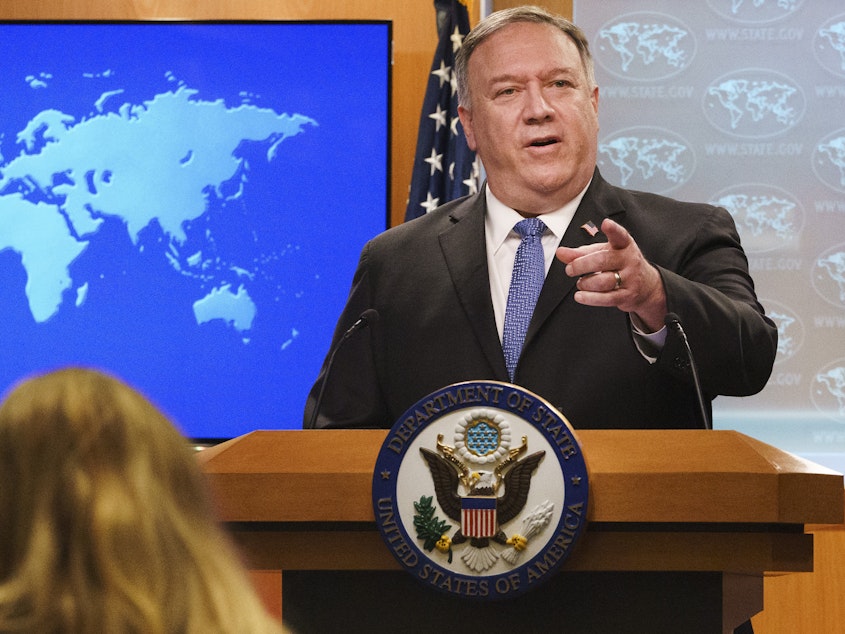Pompeo's Legacy Of Partisanship And Wading Into Political Waters

Secretary of State Mike Pompeo launched another broadside against China on Wednesday, warning of Chinese threats to U.S. research universities.
"Americans must know how the Chinese Communist Party is poisoning the well of our higher education institutions for its own ends, and how those actions degrade our freedoms and American national security," he said in a speech in Atlanta at Georgia Tech.
Pompeo accused China's Communist Party of trying to "steal our stuff and pressure critics to keep quiet."
It was a reprise of a favorite theme for Pompeo, who has used recent speeches and interviews to burnish his image as tough on China and Iran. His choice of venue, though, is drawing criticism, taking place less than a month before key runoff races in Georgia that will determine which party controls the U.S. Senate.
Pompeo's critics see his trip to Georgia at a politically tense moment for the state as another example of America's top diplomat breaking norms by getting involved in domestic politics.
Sponsored
"Secretary Pompeo's lasting mark on American foreign policy is the extent to which he politicized the State Department and the conduct of American foreign policy and made it a part of advancing his own domestic political interests," says Tamara Cofman Wittes of the Brookings Institution.
Pompeo, who has presidential ambitions and is considered a contender for the Republican nomination in 2024, has used State Department resources to network, she says. Congressional Democrats are looking into the "Madison Dinners" — taxpayer-funded private functions — that Pompeo and his wife Susan Pompeo hosted for Republican donors and supporters at a cost of at least $45,000, according to receipts obtained by the watchdog group Citizens for Responsibility and Ethics in Washington.
Pompeo brushes off the criticism. Answering questions following his Georgia Tech speech, he insisted his trip was not about partisanship. "I don't think a single thing I said today reflected a partisan viewpoint, but rather relied on a data set," Pompeo told students.
The moderator did not ask him to comment on the Georgia Senate runoffs or his controversial remark last month that "There will be a smooth transition to a second Trump administration," in which he amplified President Trump's baseless claims about the U.S. election results.
Pompeo's readiness to wade into political waters was on full display in his recent trip to Israel, where he visited a West Bank settlement and an Evangelical Christian museum, stops that can boost his appeal among fellow Evangelicals.
Sponsored
When Pompeo first arrived at the State Department in April 2018, some veteran U.S. diplomats hoped that his close relations with President Trump would mean that after the previous year of cutbacks under Rex Tillerson, the State Department was back in the game.
"They may have been demoralized, but they seemed in good spirits," Pompeo told reporters after meeting American diplomats in Brussels at the U.S. mission to NATO, on his first trip as secretary of state. "They are hopeful that the State Department will get its swagger back, that we will be out doing the things that they came onboard at the State Department to do. To be professional, to deliver diplomacy, American diplomacy around the world – that's my mission set, is to build that esprit and get the team on the field so that we can effectuate American diplomacy."
His close ties to Trump often came at a cost to that team, though. Pompeo refused to support U.S. Ambassador to Ukraine Marie Yovanovitch, who was ousted in 2018 after a smear campaign by Trump's personal attorney, Rudy Guiliani. More recently, Pompeo left his ambassadors with no talking points on the U.S. election results after his controversial remark about a "second Trump administration."
Pompeo counts his work against abortion rights as one of his major achievements as secretary of state. During his tenure, the administration expanded what is known as the global gag rule to block all funding to organizations overseas that provide abortion counseling or services.
In October, Pompeo signed an anti-abortion declaration with countries including Belarus, Hungary, Egypt, Pakistan and Saudi Arabia.
Sponsored
"We continued our unprecedented defense of the unborn by signing the Geneva Consensus Declaration alongside 32 other nations," he told reporters in November. "I'm especially proud that we've made religious freedom a top priority in the United States foreign policy for the first time in America's history."
Rori Kramer, a former State Department official, worries that some civil liberties may be curbed in the name of religious freedom. She points to the latest international conference on religious freedom, which was hosted in Poland, "a country that has LGBTQ-free zones," she says, "that has basically banned all reproductive access." The State Department launched the annual gatherings and worked closely with Poland on this year's event.
Kramer, who is now with the American Jewish World Service, believes Pompeo has been pushing his religious beliefs to "degrade the rights of women, girls and LGBTQ people."
He stripped the State Department's annual human rights reports of any mention of reproductive rights for women. And the Commission on Unalienable Rights, which he set up in 2019 to address his concerns about a "proliferation of rights," put greater emphasis on property rights and religious freedom than other rights.
"When I worked at the State Department, we didn't infuse politics and religion into policy, in particular into universal human rights. And so now the State Department staff has been asked to make basic human rights of others into a domestic political issue," says Kramer.
Sponsored
She expects the Biden administration to reject some of these policies. Trump's envoy on religious freedom, Sam Brownback, though, told reporters recently that he's hoping Pompeo's emphasis on religious freedom will outlive his tenure as secretary of state. [Copyright 2020 NPR]



